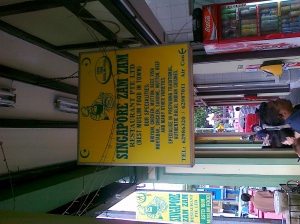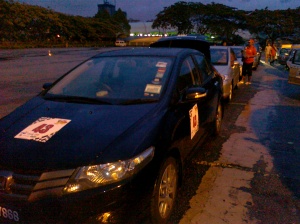By Syed Akbar Ali
Here is another story. A friend who comments often on this Blog, went to the Registrar of Societies (ROS) to register a new persatuan. They asked him to fill all the forms, chop & sign everything, attach photocopies of IC, etc. Then he was told to drop off the application into a hole set up at the counter at the ROS. There was no “acknowledged received” etc. When he asked for an acknowledgement, the ‘don’t disturb me’ guy working at the counter said, “this is the new system, no need for acknowledgement, we will send you a letter. You can go now”.
So he went back and waited, for two months. Nothing happened. So he went back and asked them what happened. The same ‘don’t disturb me’ guy said they had no record of receiving any such application. So my friend flew into a tantrum and started yelling. So they said, ‘please fill up another set of borang, do the photocopies again and give it to us and we promise to get it done in two weeks. My friend yelled again, ‘you mean you must first lose my application, I must wait two months, then I come and beg and now you will process my application in two weeks?’
So this is what is happening over the counter at our Government departments. How do you fix this? Why not just follow how they do this in Finland, Iceland, North Korea, Singapore or maybe even in Ali Rustam’s Melaka? Apa susah sangat? If lets say in Melaka or Singapore they can get this done in 48 hours, why not we just follow them? Apa susah sangat?
Or maybe someone can tell the wife of the Prime Minister? So that she may tell her husband. I heard that is a quicker method of getting things done nowadays.
We will become worse than Zimbabwe in double quick time if we do not speed up the Government delivery system. And where is Pemandu & Pemudah? (do you realize that pemandu & pemudah rhymes with hisap candu & hisap dadah?)
Here is another story. My son and his college friends went to Pulau Ketam to take pictures and make some sketches of the place. They took the last commuter train back from the Klang Commuter station. It was the last train but the ticket counter was closed. So everyone (about 30 people) lined up at the ticket vending machine, which accepts coins. So everyone began running around looking for coins. Then they found out the machine was rosak – it would spit out all the coins. There were two uniformed KTM guys lepak-ing at the turnstiles. So naturally everyone went to the two guys and asked for help. The guys just said, ‘kena beratur, cuba mesin sekali lagi’. This went on for sometime (the train had not arrived either). Finally the boys called up another friend who picked them up by car. The fate of the remaining 30 passengers is not known. How did they get home that night. Did they just board the train without tickets? What system is this? Where are Pemandu and Pemudah? (it still rhymes with hisap candu & hisap dadah)
These things happen in our country everyday. I can safely say that this is the general state of the type of counter service at Government departments in our country. The exception being the Passport counter at the Immigration Department and some Government hospitals which provide excellent service. Biar saya ucapkan tahniah dan ribuan terima kasih. But minus these exceptions, overall it is not good. What are we doing to improve this situation? Shall we hire more “con”-sultans? Pemandu, Pemudah?
The same thing happens in the private sector. My other son and his friends went for lunch at a steak restaurant in Kuantan. They asked for ‘black pepper’. The girl looked puzzled, smiled and disappeared. After a while she came back with a newspaper. She thought they wanted the ‘paper’. So they explained again ‘saya nak lada hitam’. Again she disappeared for some time. A while later she came back with a small bowl of cut ‘cili padi in black kicap’.
The boys then started using hand gestures to explain the salt and pepper shaker. Finally the girl understood and reached behind a counter and got the pepper shaker. I have been to that same restaurant and the Bangla boys who also work there are exactly on the dot when taking orders and when you ask them for anything.
Here is another example. I once walked into a hardware shop to buy some ‘kayu panjang’ to string up some plants in our garden. I picked up about half a dozen pieces of the kayu which was quite long and would not fit into my Ford 4WD. So I asked them to cut the ‘kayu panjang’. There was a young boy there (possibly an SPM holder) and I told him ‘adik tolong potong bagi dua, sama panjang’. He had a Black & Decker power saw, a measuring tape, pencil, ruler everything (it was a hardware shop lah). I left him to cut the wood into two pieces and went to get nails etc. When I came back about ten minutes later he had cut the wood pieces into two, but all of unequal lengths. No two pieces were of the same length, some were as much as six inches off. When I asked him, he said he did cut the wood ‘sama panjang’ !
Folks here is another example. I go for walks sometimes at the Lake Gardens. Since I don’t wear a watch, often I ask someone for the time. I have noticed that when I ask the time from people who are wearing watches with hands (non digital) they often have problem telling the time quickly. Too many times I have heard them say ‘jam saya rosak’. They just cant tell the time fast enough. They cannot do the multiplication fast enough to say it is 6:35pm or 6:47pm. Only those wearing digital watches tell the time quickly. If you don’t believe me, try this experiment yourself. I am not kidding.
Here is another example. The air conditioning guys came to fix an air conditioner. They had to fix an exit pipe for the water to drip. They fixed the exit pipe sloping upward (instead of downward). Of course water cannot run uphill. My wife spotted the mistake and had to tell them to reposition the exit pipe so that the water could drain off. This took extra time and work (and money). You can lose your business if you make mistakes like that. But the boss is my friend so I keep going back to them, against my wife’s advice.
Once we renovated the bathroom. The contractor I called took about two months to complete the job. The kitchen area near the bathroom was a mess for two months. My wife was at her wits end. The guy I hired kept disappearing to his kampong. Although I paid him cash advances he did not pay his workers and he also did not buy the materials from the hardware shop (cement, bricks etc). I ended up supplying lunch for the workers so that at least they could work.
When we want to make renovations in our shop, I call my Chinese contractor. He charges top dollar but the work gets done and it is good. And he works overnite (until 4 am in the morning) because we have to open the shop for business by 10 am.
An elderly friend sent his old car to the workshop for some repair. The car did not come back for three months. The mechanic had to balik kampong, jatuh sakit, cuti and all kinds of excuses. If you take the car to the Chinaman mechanic, he will tell you almost exactly what time he will get it done, then he will call you and say ‘Boss, kereta sudah siap. Saya tutup pukul tujuh malam. Tolong mari ambil kereta’.
Both are equally competent in their technical skills. What makes the difference? The difference is in the the attitude. Why is the attitude so different? Is it because of the culture? Is it because of the religion? Has anyone done an objective study? We really have to think this through carefully. Because herein lies the real problem and hence the real solution for this country.
This is the general level of competence of our people everywhere. But please be aware, not all kids are like this. Budak Cina berumur 18 tahun pun berbeza sekali. Jadi apa bezanya? Ataupun kenapa depa beza sangat? Why don’t we really seriously study and make comparisons and make a real attempt at finding out what produces these “racial stereotypes”? Anyone who says there is no such thing as “racial stereotyping” is a dunggu. If you think otherwise don’t bother sending your comments here. Buang masa saja.Most of the people I am talking about above here are school leavers, meaning SPM holders. But among them there are also STPM and Diploma holders. And also increasingly degree holders. And lets be frank, these are mostly Malay kids ok. Budak-budak kita. Please don’t take these examples lightly. What I am describing here are actually “poverty manufacturing issues”. This is how poverty is manufactured. This is how we become poor. When the general level of competence of our population at large is just so incompetent, we become poor. And we remain poor.
The vast majority of our future generation are SPM holders. Many are also PMR holders. But let us not get too excited with our SPM holders ok. One man who has been marking the SPM exam papers says that the passing marks for SPM Matematik can be as low as 15 marks !!!! This is really shocking. 15 markah saja boleh lulus Matematik SPM !
Can our YBs raise this matter when the Parliament Session starts in October. Ask the Minister of Education to give exact details about the minimum passing marks for all SPM subjects. Also ask what are the minimum marks for our SPM students to get an A? Lets be transparent. No hiding information. I think the situation is very, very bad. How else do you think the kids can score 17As, 15As or 12As? When I did the MCE (Malaysian Certificate of Education) in 1977, we were told that an A1 was 90 marks and above. A2 was 80 to 90 marks. Out of eight subjects I got 5As in Physics, Mathematics, two English subjects and Geography. Although I have not studied Geography any further until today I can recall what I learnt in Form 5 Geography. But nowadays the kids can get 17As in a jiffy because they only need 15 marks to pass Mathematics.
Folks, who are we trying to fool? Ourselves? What for? Dan yang ramai sekali terlibat kesan negative “markah rendah” ini penuntut Melayu. Why? Because they are the majority lah. 65% – 70% of our population is Malay. In some Government schools, 98% – 100% of students are Malay. These are demographic realities. You cannot run away from facts.
I don’t think I am too far off if I say that this is the general level of competence of our people. This is 2010. 50 years ago, there may not have been steak joints or DIY hardware shops in the country. But the world is just so super duper changing all the time. If we cannot keep up, we will become poor. I have blogged about Universal Studios in Singapore. They employ so few people for such a large outfit. Most of the kids there are school leavers too – ‘O’ Level holders from Singapore or SPM holders from Johore. Yet they run the place, they can answer almost any question pertaining to their job and more. In Korea, the young people manning their shops, hotels, counters etc are not only well informed but they jump out to serve you. That is why their country is getting wealthier and wealthier.
And talking about our university graduates, only about 2% – 4% of our population is educated above high school (degree and diploma holders). This includes all races. Kalau tolak non Malays, Melayu degree holders lagi sikit. This ‘drop in the ocean’ is the average for most countries, including the US.
In Sweden (not only one of the highest per capita income countries in the world but also a country where crime is low, corruption is less, where neighbours are decent and people are more human) they have achieved 30% of population with tertiary education. We must aspire for the same too. But it must be a quality university education.
Our university graduates often cannot even write a sentence properly – in any language. And please forget about their English skills. If the Government and the GLCs don’t hire them, many bumiputra graduates will not have a job at all. They are “unemployable”. The same is not true of our non bumiputra graduates. Non bumiputras graduating from UKM or UM can straight away get jobs even overseas in Hong Kong, Australia, UK, New Zealand, Singapore and elsewhere. They read the same text books, are taught by the same lecturers and even eat the same campus food. What makes the difference?
Yesterday I heard something else. The IT department of one GLC does not hire bumiputra graduates for some IT jobs. The graduates think they are too clever and they refuse to read or be trained for new skills like learning Java. So the GLC hires bumiputra SPM leavers who are more willing to be trained on Java. And they serve the GLC sufficiently well for its Java language programming purposes.
To digress, it makes no difference whether it is UMNO, PAS, BN or Pakatan that rules the nation. That is oversimplifying the matter. Do you think that if PAS becomes the Government tomorrow, my air cond guy will stop making mistakes in fixing the drip pipe? Or the Malay renovation contractor will work until 5 am to finish my shop renovation? Or that the young kid in that hardware shop will do a better job of ‘potong bagi dua, sama panjang’? That is not going to happen anytime soon folks. Please wake up. Please grow up too. The problems are a bit more deep rooted than that. All the problems that we are facing can be summarized into just a few words : the Malays must compete. Meaning the Malays cannot yet compete in sufficient quantity.
Then someone should make a survey of the number of Malay versus non Malay university graduates who ‘berhenti kerja’ from their first job. I knew too many friends who would quit their jobs at the drop of a hat. I recall one bank pleading with its new bumiputra recruits, ‘please work for us for at least five years, and get your feet really wet before you want to move on to another job’. The five graduates in that group all left within just one year.
Even Dr Mahathir complained that he spent tons of money to train a Malay bakery chef to run his bread business (The Loaf). The guy quit too. This is an attitude problem. This problem has to be solved. It does not require a billion Ringgit of modal, crony contracts, monopoly projects, APs or monopoly licenses. Its just an attitude problem.
Then I know of business people who have become ‘kaya sikit’, and then they don’t serve their customers well anymore. When they serve you, it is as though they are doing you a favour. In the kedai emas business, I knew one Kedai Emas Kelantan in Pantai Dalam who handled only Kelantanese customers. That’s what his non Kelantanese customers complained to me so often. He would also close shop often and disappear. Not long after his business closed down.
Another kedai emas usahawan also opened her shop irregularly. Her timing was also off, she would open shop late (3 or 4 pm) and close at 9pm. Latest I heard from some of her customers is that she is also closing down.
Then there is the “ponteng kerja” problem. Even after 12 years of running our business, every morning we must do a roll call because the staff that we hire can go AWOL at anytime. Its an endless series of ‘ada siapa tak datang kerja hari ini’. I am not the only complainant here. Young Malay kids just don’t realize the importance of going to work everyday and building up tenure or racking up the experience. They don’t think beyond tomorrow.
Just yesterday, a young girl whom we were training to become an executive quit. After more than a year she is leaving for a yet to be defined job somewhere else. Why? No answer. She was unhappy too and cried. Further digging revealed family issues etc. Pening kepala saya.
Another girl we had moulded for seven years from the age of 18 to become a manager (she can run the business all by herself) just quit on us a few years ago, giving us 24 hours notice. Why? Suami suruh ikut. Ikut pergi mana? Pergi ke Johor. Pasal? Dia dapat kerja baru. ‘Ok’ we thought. Then two weeks later she came back to KL. There was no job for the suami in Johor. Feeling segan she did not come back to us. Until half a year had passed. Then she came back. Then things were fine for another couple of years. Then she quit again this year to take care of her young kids. But at least by now, she is 26, she is a fully capable business manager. She still helps us out from time to time. But these kids don’t sustain. There is always this ‘ada hal’ issue.
Then there is the ‘cuti’ problem. We always lose staff over long holidays. Over the Hari Raya holidays, there are always staff who balik kampong and go AWOL for two weeks or one month after Raya. They most certainly lose their jobs. Which employer is going to wait for them to finish their AWOL. But they don’t seem to worry too much. They don’t really look beyond today at their future. The cuti is more important.
They always get side tracked from the real issues at hand. The contractor guy whom I hired to renovate my bathroom just had this never ending ‘saya ada hal di kampong’ problem. He was a breadwinner so he was constantly being asked to ‘balik kejap’. But the nature of his contracting job determined that if he was not at the work site, he would lose his business. Which he did eventually. He was never dependable – the most important criteria for anyone wanting to survive in any business be it contracting, kedai emas or a private doctor. If your customers cannot rely on you, cannot depend on you, cannot be sure if you will be around tomorrow then they will not come back to you. People will say ‘tak boleh harap’.
Other than ‘ada hal’ issues (which usually means family matters, ‘kena balik kejap’ etc) sometimes people also disappear to ‘lawat kawan sakit’ or ‘jiran saya masuk hospital’. And they can be absent for two days. Then there are the “big time” disappearances like ‘dah pi umrah’ or sometimes ‘dia sudah pergi tabligh’. Folks I am NOT making this up. The ‘sudah pergi tabligh’ is a very nice young man who makes roti canai in a mamak joint in Masjid India. This young man’s fast hands make roti canai for about two hundred people a day – dia punya pahala lagi banyak daripada air Sungai Kelang – believe me. But he disappears on tabligh for months. He has a wife and young baby daughter – who also wears a mini tudung for babies !!
Each time he disappears on tabligh, his mamak boss has to find a stand in. But how is this young man, who is very capable, pleasant and talented ever going to run his own business and be the Tuan that he should be in his own tanahair if he drops everything and disappears on tabligh for months at a time? Who is going to feed his family? More importantly his customers will go elsewhere. Bukan susah nak buat roti canai pun.
Ini pun kita masih main kat tepi saja. We have not talked about how to price products, marketing strategies, promotions, hiring and training staff, branding our business, creating a niche, keeping up with the competition, etc etc etc – the million things about the actual running of any business.
So the usual complaint that the Malays “tak cukup modal nak buka niaga” is not the reason anymore. There is enough modal. The Government has been dumping billions and billions into the NEP since 1970. My wife and I started our jewellery business 12 years ago with just RM50,000 without any help from anyone. That includes shop renovation. Our opening stock was just about RM25,000 then. And the non Malays too can start business with little capital.
The issue is not modal. Neither is it not enough university graduates or not enough higher education. The issue is not UMNO or BN or PAS or Pakatan either. The issue is one of attitude, commitment, culture and religion. We have to make serious changes here – and we have to do it yesterday. We don’t have time.
Why? Because the rest of the world (and the non Malays) are moving ahead at light speed. And wealth is relative. Relative to your neighbor. If your neighbour’s child who goes to the same school, reads the same books, eats the same roti canai and goes to the same university can get a job in Hong Kong, Australia, Singapore or anywhere in the world or run a business successfully but your child can only get a job with the Government or with a GLC, then your neighbor is moving ahead very far and fast. We are not. The jurang perbezaan is going to worsen. This will be the case no matter who is in power.
I personally believe that if the PAS or Pakatan come to power the Malays will be left even further behind. Look at Kelantan. What has 25 years of PAS rule done for them? All those people who say that ‘orang Kelantan kaya’ are delusional. Much of the money in Kelantan comes from tom yam stall remittances in Kuala Lumpur. Kelantan is undoubtedly the “kereta 2nd hand” capital of Malaysia. All sorts of old junk cars can be found there. If you collect old Mercedes Benz cars, you can buy spare parts for them anytime in Kota Bharu. It’s the “old car” capital of Malaysia. People there are poor.
This is the only problem in Malaysia. The Malays cannot yet compete. We have to figure out quickly how to make them compete. Modal, university education, project, kontrak, peluang niaga etc are available aplenty. What we do not have in plenty is the work ethic and the attitude. That is the only part that is missing.
But I most definitely and convincingly believe that we can make a paradigm shift, we can make a complete transformation of all our capabilities within just one lifetime. 15 years is enough time to completely revamp this country. Even 10 years is enough to completely change the Malays. But we must make the right decisions. It is easy. Just get rid of the ‘not useful’ things and increase the ‘more useful’ things in our country. We must be brave. We need brave leaders who are not afraid. We need a cultural, religious and social transformation of the Malays so that they can compete. I really believe this can be done. To me it is quite clear what we must do.
The formula is simple : it involves religion (aka conformity), science, technology, culture, the right language (English) and most important of all modernizing our thinking. We need much more of some and much less of the others. If we don’t tackle this in a hurry, then we better learn to say “Mangwanani Livukenjani.” According to a phrasebook I found on the Net, it means ‘Good Morning’ in Zimbabwe. If we don’t get our act together, our grandkids may need to migrate to Zimbabwe to work in their golf courses or something. “Fambai zvakanaka Uhambe kuhle” – that means ‘good bye’. (Their language is not efficient in words too).


















